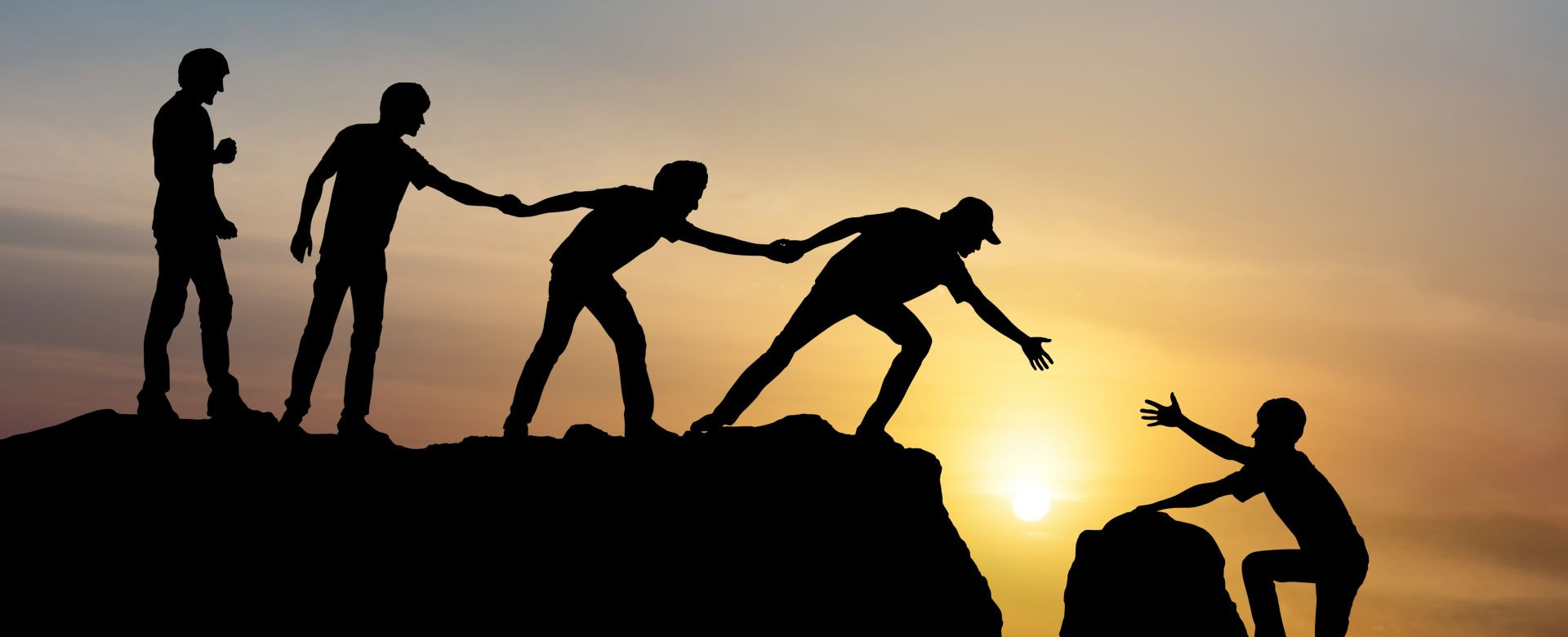
Can financial reporting solutions effectively support ESG reporting requirements?
ESG reporting is becoming more important for businesses. Some are thinking about using their financial reporting tools for this. But with ESG covering so many areas, can these tools really do the job? Let's look into the challenges of this approach.
The Significance of ESG Reporting in the Corporate Reporting Landscape
Environmental, social, and governance (ESG) reporting has become an important part of corporate reporting. ESG metrics help investors and stakeholders to evaluate the overall risk and sustainability of the company’s performance. As a result, companies are under increasing pressure to report on their ESG performance, but they face several challenges while doing so. One of the primary challenges is choosing the right software solution to collect and report ESG metrics. Some companies consider using financial reporting solutions for ESG reporting. But will these solutions offer a fitting solution for the challenges ESG reporting will pose? In this blog post, we will discuss the limitations of using financial reporting solutions for ESG reporting.
A single-function solution for a cross-functional challenge?
ESG is by definition a cross-functional topic. Typically, human resources will play an import role in social topics, procurement, and operations will play major roles in environment topics and governance touches management all over the board. Almost every function within a company needs to contribute. So a solution for ESG reporting needs to bring insights from all these functional area’s together. Financial reporting solutions were designed with the financial user group in mind. Typically, spreadsheet-like user interfaces and formal workflows are being used. These solutions might not be a good fit with the needs of other functions in your organization. This can undermine user adoption of this relative new process in your organization.
What is the appropriate investment for an ESG reporting solution?
Since ESG reporting is a topic that touches many functions in your organization, many people must be involved. In financial reporting, only professionals in the finance function are involved. A financial reporting solution typically carries a price tag that is based on that focused user base. In ESG reporting, things are different. Much more people are involved but often for just their part of the total ESG scope. When you multiply the number of people involved in the ESG reporting process with the average price tag of a financial reporting solution, you will soon conclude that the total cost for a financial reporting solution to support an ESG reporting process is very high. This is the reason why some organizations collect data from non-finance functions using data-interfaces and spreadsheets. This tactic has multiple drawbacks, one we will discuss in the next paragraph.
How can a financial reporting solution break the audit trail?
Assurance is one of the concerns you wouldn’t expect when you use a financial reporting solution for ESG reporting. Finance systems are built for compliance, and assurance is in the roots of these solutions. So why is this a concern for ESG reporting? The main cause for this is the use of spreadsheets to collect data from non-finance functions as a first step in the process. This solution is often implemented for the two reasons we mentioned in the preceding paragraphs (quality of the user interface and cost per user). By using spreadsheets, the audit trail is broken and assurance is extra complicated and costly. A good ESG reporting solution offers an unbroken audit trail, storing all data, comments and documents in one managed environment.
Is ESG reporting solely focused on numbers?
ESG reporting differs from financial reporting in another important way. ESG reporting is far more qualitative than the more quantitive financial reporting. So capturing the ESG data can be a challenge in a financial reporting solutions. For instance, items where you need to use a likert scale, can be a challenge. Of course, workarounds can be created to overcome these challenges but it is clear that these solutions were designed for a different audience and different challenge.
Going beyond the boundaries of your own organization?
ESG reporting is more and more driven by supply chain dynamics. There is much emphasis on scope 3 emissions in recent regulations. Topics like sustainable sourcing are driving the need to collect data far beyond the boundaries of your own organization. Simple usage data can be collected by using interfaces or files, but for more insight into your supply chain, you need more advanced ways to collaborate with your supply chain partners. This can be a challenge for financial reporting solutions. By design, they are focused on a user group within your own organization.
Conclusion: financial reporting solutions cannot do it alone
In conclusion, while financial reporting solutions have served corporations well in the field of financial data aggregation and reporting, they fall short when it comes to the multifaceted and comprehensive demands of ESG reporting. The cross-functional, qualitative, and extended supply chain nature of ESG data requirements necessitates a solution that is inherently more collaborative, flexible, and comprehensive. Leveraging purpose-built ESG reporting software that can cater to these unique needs is a critical step towards successful and effective ESG reporting. Therefore, while financial reporting solutions may form a component of your ESG reporting process, they cannot be the complete solution. Be sure to consider this when planning your ESG reporting strategy.
More news
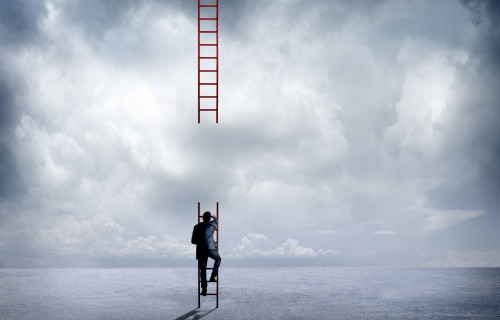
What is causing the ever growing sustainability data gap?
One of our work’s benefits is that we speak to a lot of sustainability and non-financial reporting professionals. It’s always a pleasure to exchange thoughts and be inspired by professionals that are passionate about such an important cause. All these conversations also give us a clear insight into common challenges. One of these challenges is more and more data collection and the sustainability data gap.

The Digital SDG: Ensure the Digital Age Supports People, Planet, Prosperity & Peace
While many uncertainties remain, one thing is clear. The lives of people and the transactions of our economy and government will move more online. In 2015, 193 nations committed to the SDGs. Which set out a transformative agenda that linked human health and prosperity to environmental health and equity. This holistic agenda is critical. But the current crisis highlights that it is incomplete. The SDGs failed to address the governance of one of the most potent forces defining humanity’s future: the digital age.
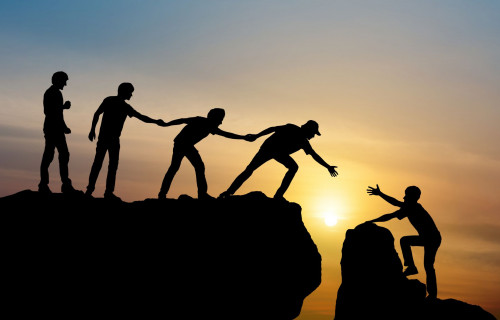
New: Beezzz user-community!
At Beezzz, we believe that continuous improvement is the key to long-term success. That’s why we’ve launched our new user-community. The community serves as a platform for daily growth. You can help us by telling us how we can improve the app. You can comment and vote on suggestions of other users. Based on all this feedback, we plan our continuous improvement in our roadmap.

2023: Whatever your challenge, we are there for you.
As a responsible professional, you are no doubt aware of the increasing importance of sustainability and social responsibility in today's world. With new regulations surrounding environmental, social, and governance (ESG) practices coming into effect in 2023, it is more important than ever to ensure that your organization is meeting these standards. However, as you work to improve your sustainability practices and comply with the new regulations, you may have noticed a significant gap in the availability of accurate and reliable data.
Bridge the gap!
This “sustainability data gap” can make it difficult for your organization to fully understand and report on its environmental impact, and can also hinder your efforts to implement effective sustainability strategies. At Beezzz, we understand the challenges you are facing and are committed to helping you bridge this gap and provide you with the tools and resources you need to make informed decisions about your sustainability practices.
We have developed a range of services and solutions that can help your organization accurately track and report on its energy use and emissions, and identify opportunities for improvement. By working with us to address the sustainability data gap, you can not only meet the new ESG regulations that are coming into effect, but also go above and beyond in your efforts to be a sustainable and socially responsible company.
At Beezzz, we are proud to be a partner in this important work and to help our clients make a positive impact on the world. If you are investigating how to improve your sustainability practices and meet the new regulations, we encourage you to reach out to us and learn more about how we can support you.
More news
Vestibulum lacinia malesuada lorem eu ultricies. Cras non vulputate nisi, et porta purus. Vestibulum faucibus, arcu eu ultrices rutrum, erat tortor pellentesque mi, nec commodo justo nunc eget arcu. Nunc sed efficitur dui. Integer hendrerit condimentum fringilla.

New: Beezzz user-community!
At Beezzz, we believe that continuous improvement is the key to long-term success. That’s why we’ve launched our new user-community. The community serves as a platform for daily growth. You can help us by telling us how we can improve the app. You can comment and vote on suggestions of other users. Based on all this feedback, we plan our continuous improvement in our roadmap.

The Digital SDG: Ensure the Digital Age Supports People, Planet, Prosperity & Peace
While many uncertainties remain, one thing is clear. The lives of people and the transactions of our economy and government will move more online. In 2015, 193 nations committed to the SDGs. Which set out a transformative agenda that linked human health and prosperity to environmental health and equity. This holistic agenda is critical. But the current crisis highlights that it is incomplete. The SDGs failed to address the governance of one of the most potent forces defining humanity’s future: the digital age.

What is causing the ever growing sustainability data gap?
One of our work’s benefits is that we speak to a lot of sustainability and non-financial reporting professionals. It’s always a pleasure to exchange thoughts and be inspired by professionals that are passionate about such an important cause. All these conversations also give us a clear insight into common challenges. One of these challenges is more and more data collection and the sustainability data gap.

The Digital SDG: Ensure the Digital Age Supports People, Planet, Prosperity & Peace
While many uncertainties remain, one thing is clear, the lives of people and the transactions of our economy and government will move more and more online. In 2015, 193 nations committed to the SDGs, which set out a transformative agenda that linked human health and prosperity to environmental health and equity. This holistic agenda is critical. But the current crisis highlights that it is incomplete. The SDGs failed to address the governance of one of the most potent forces defining humanity's future: the digital age.
The Digital Age
The digital age is disrupting social systems and driving transformations at a scale and pace unparalleled in history. Decades ago, philosopher and media theorist Marshall McLuhan inspired the aphorism: “We shape our tools, and following our tools shape us.”
The Digital Divide
Nowadays, digital technologies are shaping everything. And they shape what we read, consume, our votes, and how we interact with each other and the world around us. Many risks and uncertainties emerge, including threats to individual rights, social equity, and democracy. All amplified by ‘the digital divide’ – the differential rate of internet penetration and access to digital technologies around the world.
The digital SDG
Along with the high risks of harm comes massive opportunities to leverage the digital age capabilities to steer society towards our common goals, as expressed through the SDGs, including net-zero carbon emissions and a more equitable global society. In the digital age, power can be decentralized from the top to the stakeholders. Social norms of consumption can be shifted towards low carbon products, and society’s mindset changed from fossil fuels to renewables. We need a new digital SDG — SDG18 — focused on the digital age, which outlines clear targets for leveraging this transformative force to benefit both people and the planet.
Sustainability in the Digital Age
The United Nations recently released a roadmap for enhancing global digital coordination in support of humanity. This sets out a much-needed framework to begin to address the digital governance gap. Which lays a base to effectively leverage the digital sector to tackle the climate crisis and broader sustainability goals.
The Montreal Statement
However, a collective statement has just been issued by leaders from business, government, civil society, and researchers: The Montreal Statement on Sustainability in the Digital Age. This Statement calls on society to recognize that tackling the climate crisis, building a sustainable world, and working toward a just and equitable digital future are inherently interconnected agendas. And above all, it lays the foundation for what could define an action agenda for the missing SDG 18.
Five near-term actions for a digital SDG
The Statement outlines five near-term actions to overcome the digital age’s profound risks and leverage its transformative capabilities to build a climate-safe, sustainable, and equitable world. These include the need to:
- Build a new social contract for the digital age, which addresses individual rights, justice and equity, inclusive access, and environmental sustainability;
- Ensure open and transparent access to data and knowledge critical to achieving sustainability and equity;
- Foster public and private collaborations to develop and manage AI and other technologies in support of sustainability and equity;
- Promote research and innovation to steer digital transformations toward sustainability and equity; and
- Support targeted communication, engagement, and education to advance the social contract.
The Statement was first formulated during an international workshop in Montreal in September 2019 as part of the CIFAR AI & Society series. It was subsequently shared, reviewed, and revised by others worldwide, working in the digital and sustainability sectors.
Unfulfilled aspirations
Motivating all this work is a realization. A realization that the initial aspirations of the digital revolution – democratization of information, the strengthening of governance through broader citizen engagement, a more equitable and greener sharing economy – were never fulfilled. Because we, as a society, failed to anticipate how the digital revolution would unfold. We did not foresee the scale of changes that would result from the new business models, governance systems, and communications systems. Nor the new types of societal challenges posed by such large-scale change. As a result, we now live in a digital age that threatens individual rights, has facilitated the propagation of disinformation, undermines trust, and can ultimately threaten democracy.
Let the digital force work for good
In conclusion, we are in a moment of unprecedented disruption. Which opens up opportunities for transformative change. Among the most potent forces defining our future are those of the digital age. We must put this force to work for people, planet, prosperity, peace, and partnerships.
More news

What is causing the ever growing sustainability data gap?
One of our work’s benefits is that we speak to a lot of sustainability and non-financial reporting professionals. It’s always a pleasure to exchange thoughts and be inspired by professionals that are passionate about such an important cause. All these conversations also give us a clear insight into common challenges. One of these challenges is more and more data collection and the sustainability data gap.

New: Beezzz user-community!
At Beezzz, we believe that continuous improvement is the key to long-term success. That’s why we’ve launched our new user-community. The community serves as a platform for daily growth. You can help us by telling us how we can improve the app. You can comment and vote on suggestions of other users. Based on all this feedback, we plan our continuous improvement in our roadmap.

New: Beezzz user-community!
At Beezzz, we believe that continuous improvement is the key to long-term success. That's why we've launched our new user-community. The community serves as a platform for daily growth. You can help us by telling us how we can improve the app. You can comment and vote on suggestions of other users. Based on all this feedback, we plan our continuous improvement in the roadmap.
We develop for you
When we started Beezzz, the first thing we agreed on was that users are leading in our development process. We believe that if you actively involve your users, we can keep the application clean. Continuously, we will ask for your suggestions for the user interface, workflows, data models, and more. Of course, our architects guard the architecture and design principles of the solution.
Your suggestions for Beezzz
In the user-community, you can suggest new functions for Beezzz. Just create a free account and enter your suggestions. Your email will only be used to update you on votes and comments on your request. Your email will never be visible to visitors of our website. You will also receive an update when we start working on your request. When creating your suggestion, you can pick a category so other users can easily found your request. 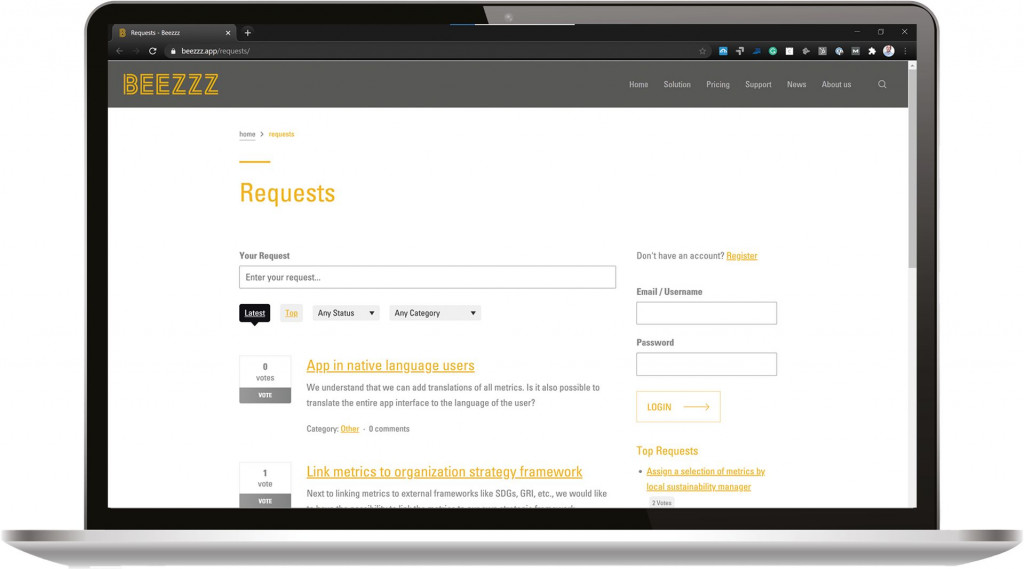
Reviewing the request of other users
You can also visit the user community to check suggestions from other users. You can vote on their suggestions if you really like it. Next to voting, you can also comment on the suggestions. For instance, to clarify what is exactly meant by suggesting to give more examples from your own context. If you receive comments on your own suggestions, you will be alerted by email to react using the platform.
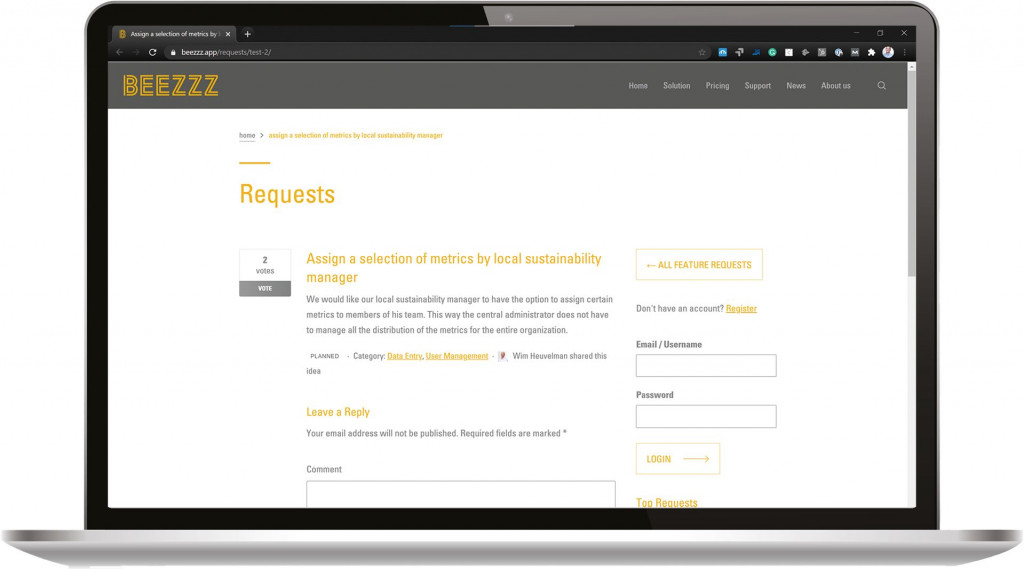
The roadmap
Your feedback is crucial for us. So each request is studied carefully, and if we agree this is something that fits the architecture, design, and purpose of Beezzz, we will include your suggestion in our roadmap. You can view our roadmap here.
A better app for a better world
Please share your best ideas by posting your best suggestions. Inspire other people with your ideas. This way, we achieve something much bigger. By helping each other, we can improve and speed sustainable development.
More news

New: Beezzz user-community!
At Beezzz, we believe that continuous improvement is the key to long-term success. That’s why we’ve launched our new user-community. The community serves as a platform for daily growth. You can help us by telling us how we can improve the app. You can comment and vote on suggestions of other users. Based on all this feedback, we plan our continuous improvement in our roadmap.

The Digital SDG: Ensure the Digital Age Supports People, Planet, Prosperity & Peace
While many uncertainties remain, one thing is clear. The lives of people and the transactions of our economy and government will move more online. In 2015, 193 nations committed to the SDGs. Which set out a transformative agenda that linked human health and prosperity to environmental health and equity. This holistic agenda is critical. But the current crisis highlights that it is incomplete. The SDGs failed to address the governance of one of the most potent forces defining humanity’s future: the digital age.

What is causing the ever growing sustainability data gap?
One of our work’s benefits is that we speak to a lot of sustainability and non-financial reporting professionals. It’s always a pleasure to exchange thoughts and be inspired by professionals that are passionate about such an important cause. All these conversations also give us a clear insight into common challenges. One of these challenges is more and more data collection and the sustainability data gap.


